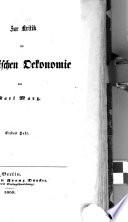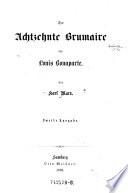„Proletarier aller Länder, vereinigt euch" - "Die Philosophen haben die Welt nur verschieden interpretiert; es kommt aber darauf an, sie zu verändern“
Schlusssatz des Kommunistischen Manifests von 1848 und 11. These über Feuerbach (redigiert durch Friedrich Engels) Grabmonument auf dem Highgate Cemetery in London, 1954 errichtet von der Kommunistischen Partei Großbritanniens ( Bilder auf WikiCommons http://commons.wikimedia.org/wiki/Karl_Marx#Grave); Inschrift engl.: "Workers of all lands unite" - "The philosophers have only interpreted the world in various ways - the point however is to change it"
Ref: de.wikiquote.org - Karl Marx / Überprüft / Grabinschrift
Thesen über Feuerbach (1845)
Variante: Die Philosophen haben die Welt nur verschieden interpretirt; es kommt aber darauf an, sie zu verändern.
Quelle: Eleven Theses on Feuerbach
Werk
Manifest der Kommunistischen Partei
Karl Marx
Das Kapital
Karl Marx
Die deutsche Ideologie
Karl MarxKritik des Gothaer Programms
Karl MarxDie heilige Familie
Karl MarxThesen über Feuerbach
Karl Marx
Zur Judenfrage
Karl Marx
Lohnarbeit und Kapital
Karl MarxMarx-Engels-Werke
Karl Marx
Das Elend der Philosophie
Karl Marx
Zur Kritik der politischen Ökonomie
Karl MarxKarl Marx Berühmte Zitate
Zur Kritik der Hegelschen Rechtsphilosophie. Einleitung. MEW 1, S. 378 http://www.mlwerke.de/me/me01/me01_378.htm#S378, 1844
Deutsch-Französische Jahrbücher (1844), Zur Kritik der Hegelschen Rechtsphilosophie. Einleitung (1844)

„Nicht das Bewußtsein bestimmt das Leben, sondern das Leben bestimmt das Bewußtsein.“
Die deutsche Ideologie. Marx/Engels, MEW 3, S. 27, 1845/46
Die deutsche Ideologie (1845)

„Der Mensch macht die Religion, die Religion macht nicht den Menschen.“
Zur Kritik der Hegelschen Rechtsphilosophie. Einleitung. MEW 1, S. 378 http://www.mlwerke.de/me/me01/me01_378.htm#S378, 1844
Deutsch-Französische Jahrbücher (1844), Zur Kritik der Hegelschen Rechtsphilosophie. Einleitung (1844)
Zitate über Menschen von Karl Marx
Diese Sentenz wird Marx in verschiedenen Zitatesammlungen ohne jede Quellenangabe, mit an Sicherheit grenzender Wahrscheinlichkeit also ungerechtfertigt zugeschrieben. Erstmals findet sich das Falschzitat, soweit ersichtlich, in Dieter Balkhausen: Die dritte industrielle Revolution, 1980, S. 239 books.google https://books.google.de/books?id=xMIMAQAAIAAJ&q=resignierend mit keiner weiteren Herkunftsangabe als: "So sprach resignierend der revolutionäre Geist Karl Marx, dessen Thesen den Kommunismus wissenschaftlich untermauerten."
Zugeschrieben
„Kein Mensch bekämpft die Freiheit; er bekämpft höchstens die Freiheit der anderen.“
Debatten über Pressefreiheit und Publikation der Landständischen Verhandlungen. MEW 1, S. 51 http://www.mlwerke.de/me/me01/me01_050.htm#S51, 1842
Rheinische Zeitung (1842-43)
Die deutsche Ideologie. Marx/Engels, MEW 3, S. 30, 1845/46
Die deutsche Ideologie (1845)
Zur Judenfrage. MEW 1, S. 370 http://www.mlwerke.de/me/me01/me01_347.htm#S370, 1844
Deutsch-Französische Jahrbücher (1844), Zur Judenfrage (1843)
Zur Kritik der Politischen Ökonomie. Vorwort, 1859, MEW 13, S. 9
Zur Kritik der Politischen Ökonomie (1859)
Zitate über die Welt von Karl Marx
Manifest der Kommunistischen Partei, IV. Marx/Engels, MEW 4, S. 493. "Proletarier aller Länder, vereinigt euch!" schon in der „Kommunistischen Zeitschrift“, von der lediglich ein „Probeblatt“ im September 1847 in London gedruckt wurde (Abbildung bei .marxistsfr.org http://www.marxistsfr.org/archive/marx/works/1847/communist-league/index.htm), nach Shlomo Na'aman: „Zur Geschichte des Bundes der Kommunisten in Deutschland in der zweiten Phase seines Bestehens“ S.5-6 Fn.2 ( fes.de http://library.fes.de/jportal/receive/jportal_jparticle_00010030) "wahrscheinlich aus der Feder von Schapper in einem Sinn, der nicht Marx entspricht".
Manifest der Kommunistischen Partei (1848)
The Difference Between the Democritean and Epicurean Philosophy of Nature (1841)
Ökonomisch-philosophische Manuskripte (Pariser Manuskripte), 1844. 3. Manuskript. Geld, http://www.mlwerke.de/me/me40/me40_562.htm
Andere Werke
Zur Kritik der Hegelschen Rechtsphilosophie. Einleitung. MEW 1, S. 378 http://www.mlwerke.de/me/me01/me01_378.htm#S378, 1844
Deutsch-Französische Jahrbücher (1844), Zur Kritik der Hegelschen Rechtsphilosophie. Einleitung (1844)
Der achtzehnte Brumaire des Louis Bonaparte. MEW 8, S. 115, 1852
Karl Marx: Aktuelle Zitate
Das Kapital. Band 1. MEW23 S. 445
Das Kapital (1867)
„Proletarier aller Länder, vereinigt euch“
"Die Philosophen haben die Welt nur verschieden interpretiert; es kommt aber darauf an, sie zu verändern" - Schlusssatz des Kommunistischen Manifests von 1848 und 11. These über Feuerbach (redigiert durch Friedrich Engels)
Paul Lafargue in: Karl Marx, Persönliche Erinnerungen, 1890, Abschnitt 1
Zugeschrieben, Paul Lafargue: Karl Marx, Persönliche Erinnerungen (1890)
Karl Marx Zitate und Sprüche
Lohnarbeit und Kapital, 1849, MEW 6, S. 402
Lohnarbeit und Kapital (1849)
Zur Kritik der Hegelschen Rechtsphilosophie. Einleitung. MEW 1, S. 386 http://www.mlwerke.de/me/me01/me01_378.htm#S386, 1844
Deutsch-Französische Jahrbücher (1844), Zur Kritik der Hegelschen Rechtsphilosophie. Einleitung (1844)
„Krieg den deutschen Zuständen! Allerdings!“
Zur Kritik der Hegelschen Rechtsphilosophie. Einleitung. MEW 1, S. 380 http://www.mlwerke.de/me/me01/me01_378.htm#S380, 1844
Deutsch-Französische Jahrbücher (1844), Zur Kritik der Hegelschen Rechtsphilosophie. Einleitung (1844)
Kritik des Gothaer Programms, MEW 19, 27
Kritik des Gothaer Programms (1875)
„Die Kinder müssen die Eltern erziehen.“
Paul Lafargue in: Karl Marx, Persönliche Erinnerungen, 1890, Abschnitt 2
Zugeschrieben, Paul Lafargue: Karl Marx, Persönliche Erinnerungen (1890)
Das Kapital. Band 1. Zweiter Abschnitt: Die Verwandlung von Geld in Kapital. MEW 23, S. 191
Das Kapital (1867)
„So gut, wie jeder schreiben und lesen lernt, muss jeder schreiben und lesen dürfen.“
Debatten über Pressefreiheit und Publikation der Landständischen Verhandlungen. MEW 1, S. 73 http://www.mlwerke.de/me/me01/me01_066.htm#S73, 1842
Rheinische Zeitung (1842-43)
Manifest der Kommunistischen Partei, I. Marx/Engels, MEW 4, S. 464
Manifest der Kommunistischen Partei (1848)
„Die Kritik der Religion ist die Voraussetzung aller Kritik.“
Zur Kritik der Hegelschen Rechtsphilosophie. Einleitung. MEW 1, S. 378 http://www.mlwerke.de/me/me01/me01_378.htm#S378, 1844
Deutsch-Französische Jahrbücher (1844), Zur Kritik der Hegelschen Rechtsphilosophie. Einleitung (1844)
Kritik des Gothaer Programms, MEW 19, 32
Kritik des Gothaer Programms (1875)
„Die Revolutionen sind die Lokomotiven der Geschichte.“
Die Klassenkämpfe in Frankreich 1848 bis 1850. MEW 7, S. 85, 1850
Andere Werke
Zur Kritik der Hegelschen Rechtsphilosophie. Einleitung. MEW 1, S. 378 http://www.mlwerke.de/me/me01/me01_378.htm#S378, 1844
Deutsch-Französische Jahrbücher (1844), Zur Kritik der Hegelschen Rechtsphilosophie. Einleitung (1844)
Das Elend der Philosophie, MEW Bd. 4, S. 182.
Das Elend der Philosophie (1847)
Das Kapital. Band 1, MEW 23, S. 193
Das Kapital (1867)
Kritik des Gothaer Programms, MEW 19, 21
Kritik des Gothaer Programms (1875)
Über "Das Kapital", an Friedrich Engels, 20. Februar 1866, MEW. Bd. 31. S. 183
Aus Privatbriefen
„Hinaus! Letzte Worte sind für Narren, die noch nicht genug gesagt haben.“
Letzte Worte, 14. März 1883 - Fälschlich zugeschrieben, da Karl Marx in Abwesenheit anderer starb
Zugeschrieben, Letzte Worte
„Der Mensch ist denselben Gesetzen unterworfen wie die Natur. Macht und Freiheit sind identisch.“
Die heilige Familie, MEW 2, S. 136
Die heilige Familie (1845)
2. These über Feuerbach. MEW 3, S. 533, 1845
Thesen über Feuerbach (1845)
Manifest der Kommunistischen Partei, II. Marx/Engels, MEW 4, S. 482
Manifest der Kommunistischen Partei (1848)
Lohnarbeit und Kapital, 1849, MEW 6, S. 416
Lohnarbeit und Kapital (1849)
Das Kapital. Band I., Abt. III., 8., 5. zeno.org http://www.zeno.org/nid/20009217916. MEW 23, S. 285
Das Kapital (1867)
Das Kapital. Band 1. Dritter Abschnitt: Die Produktion des absoluten Mehrwerts. MEW 23, S. 247
Das Kapital (1867)
„Die Gewalt ist der Geburtshelfer jeder alten Gesellschaft, die mit einer neuen schwanger geht.“
Das Kapital. Band 1. Siebenter Abschnitt: Der Akkumulationsprozess des Kapitals. MEW 23, S. 779
Das Kapital (1867)
Kritik des Gothaer Programms. MEW 19, S. 18, 1875/1891
Kritik des Gothaer Programms (1875)
Brief an Friedrich Engels, 1869, MEW 32, S. 360
„Alles, was ich weiß, ist, dass ich kein 'Marxist' bin.“
Friedrich Engels, Brief an Konrad Schmidt, 1890, MEW 37, 436
original: Marx sah auch diese Jüngerschaft voraus, als er von dem zu Ende der siebziger Jahre unter gewissen Franzosen grassierenden "Marxismus" sagte: "tout ce que je sais, c'est que moi, je ne suis pas marxiste" - "ich weiß nur dies, daß ich kein 'Marxist' bin". Friedrich Engels in einem Brief an die Redaktion der "Sächsischen Arbeiter-Zeitung" in Dresden vom 12. September 1890, abgedruckt in "Der Sozialdemokrat" Nr. 37 vom 13. September 1890, http://www.mlwerke.de/me/me22/me22_068.htm
Zugeschrieben
mit Friedrich Engels: Zirkularbrief an Bebel, Liebknecht, Bracke u.a., MEW 19, S. 165, 1879
Andere Werke
The Communist Manifesto
Die deutsche Ideologie. Marx/Engels, MEW 3, S. 35, 1846/1932
Die deutsche Ideologie (1845)
Die deutsche Ideologie. Marx/Engels, MEW 3, S. 218, 1846/1932
Die deutsche Ideologie (1845)
„Es gibt keine politische Bewegung, die nicht gleichzeitig auch eine gesellschaftliche wäre.“
Das Elend der Philosophie, MEW Bd. 4, S. 182
Das Elend der Philosophie (1847)
„Ein Gespenst geht um in Europa, das Gespenst des Kommunismus.“
Manifest der Kommunistischen Partei, Einleitung. Marx/Engels, MEW 4, S. 461
Manifest der Kommunistischen Partei (1848)
Manifest der Kommunistischen Partei, I. Marx/Engels, MEW 4, S. 476,
Manifest der Kommunistischen Partei (1848)
Karl Marx, Friedrich Engels, Manifest der Kommunistischen Partei. MEW 4, S. 472
Manifest der Kommunistischen Partei (1848)
MEW 15, S. 43
Sizilien und die Sizilianer (1860)
Das Kapital, Band 1. Siebenter Abschnitt: Die sogenannte ursprüngliche Akkumulation. MEW 23, S. 784
Das Kapital (1867)
Marx an Ludwig Kugelmann, 12. Dezember 1868
Aus Privatbriefen
Redaktionelle Anmerkung zu dem Artikel "Die Schneiderei in London oder der Kampf des großen und des kleinen Capitals" von J. G. Eccarius in Neue Rheinische Zeitung, 6. Heft, Oktober 1850 nach MEW 7 (5. unveränderte Auflage 1973), Dietz Verlag, Berlin, S. 416
Andere Werke
Differenz der demokritischen und epikureischen Naturphilosophie. (Dissertation) MEW 40, S. 327f.
Schule und Studium, Differenz der demokritischen und epikureischen Naturphilosophie (1841)
Zur Kritik der Hegelschen Rechtsphilosophie. Einleitung. MEW 1, S. 385 http://www.mlwerke.de/me/me01/me01_378.htm#S385, 1844
Deutsch-Französische Jahrbücher (1844), Zur Kritik der Hegelschen Rechtsphilosophie. Einleitung (1844)
Zur Kritik der Hegelschen Rechtsphilosophie. Einleitung. MEW 1, S. 385 http://www.mlwerke.de/me/me01/me01_378.htm#S385, 1844
Deutsch-Französische Jahrbücher (1844), Zur Kritik der Hegelschen Rechtsphilosophie. Einleitung (1844)
Zur Kritik der Hegelschen Rechtsphilosophie. Einleitung. MEW 1, S. 381 http://www.mlwerke.de/me/me01/me01_378.htm#S381, 1844
Deutsch-Französische Jahrbücher (1844), Zur Kritik der Hegelschen Rechtsphilosophie. Einleitung (1844)
Zur Kritik der Hegelschen Rechtsphilosophie. Einleitung. MEW 1, S. 391 http://www.mlwerke.de/me/me01/me01_378.htm#S391, 1844
Deutsch-Französische Jahrbücher (1844), Zur Kritik der Hegelschen Rechtsphilosophie. Einleitung (1844)
Die deutsche Ideologie. Marx/Engels, MEW 3, S. 46, 1846/1932
Die deutsche Ideologie (1845)
Das Elend der Philosophie, MEW Bd. 4, S. 97.
Das Elend der Philosophie (1847)



